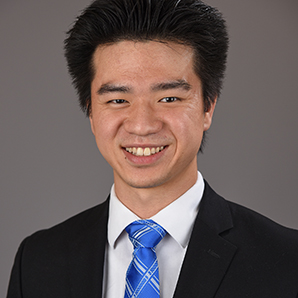Why did you choose graduate school at IUPUI?
I chose to go to graduate school at IUPUI (IU School of Medicine) because of two reasons. First, I wanted to continue my research with my long-time mentor, Dr. Kenneth Lim, investigating cardiovascular complications in patients with chronic kidney disease. Second, I wanted to learn from the cutting-edge research being done by the world-renown investigators within the Division of Nephrology & Hypertension, which is led by Dr. Sharon Moe, who has also become my co-mentor. My career goal is to become a physician-scientist in the field of Nephrology, and I cannot think of a better place to train than at the IU School of Medicine which is home to an incredible network of global leaders in the field of nephrology.
What has been your favorite academic accomplishment since you’ve been here?
My favorite academic accomplishment thus far is having the incredible honor of being selected to receive the NIH Ruth L. Kirschstein National Research Service Award (NRSA) Comprehensive Musculoskeletal Training Program T32 Fellowship through the Indiana Center for Musculoskeletal Health. Through this fellowship, I have been able to kick start my PhD work and the program has provided amazing opportunities to learn, network and collaborate with investigators in the mineral-bone disorder field and other related complications in chronic kidney disease.
What do you enjoy most about life in Indianapolis?
In contrast to my experience living in suburban/urban cities on the West and East coasts, I enjoy the relatively calmer scene of Indianapolis, and the friendly Midwestern culture of the community.
Please provide some details about your work/research as a graduate student and/or any activities you are involved in.
I am investigating the role of an anti-aging protein, Klotho, in treating cardiovascular complications, such as cardiac fibrosis and vascular calcification, in patients with chronic kidney disease. These complications significantly increase the risk of mortality, and there are no clinically available treatments to combat against them. Evidence has shown Klotho as a potential therapeutic yet more research is needed to understand the mechanisms behind Klotho’s cardioprotective effects. During my time in graduate school, I have developed a novel targeted mass spectrometry assay to accurately quantify different forms of Klotho, which has led to a provisional patent, and I have discovered that a smaller form of Klotho, called KL1, can exert direct effects against cardiac fibrosis and calcification in preclinical models of chronic kidney disease.


